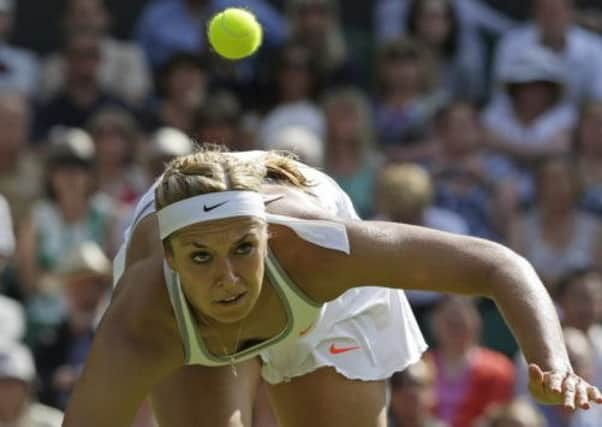Wimbledon: Lisicki all smiles as final awaits


It would be stretching it to say that Lisicki has it within her to energise a fairly dour era in the women’s game, but she certainly has an immensely powerful game, courage in spades, and a smile that lights up a room. Hers is a love affair with Wimbledon, tinged with a touch of the miraculous given her improbable comeback in this semi-final from 3-0 down in the third, the exact same spot from where she recovered in her giant-kill against Serena Williams at the beginning of the week.
Tomorrow will be Lisicki’s first grand slam final and she is the first German to make the women’s showpiece since Steffi Graf in 1999. She said she was overwhelmed after taking the dramatic final set 9-7, Radwanska breaking Lisicki’s twice but, critically, Lisicki breaking Radwanska three times. It was that type of game. A real rollercoaster ride.
Advertisement
Hide AdAdvertisement
Hide AdLisicki doesn’t just talk about what all of this means to her, she gushes. “The first time I was here I fell in love,” she said. “It was the place I always wanted to play at because as a little girl you never know what’s going to happen. There is no better feeling in the world to have so much support on that beautiful Centre Court. It’s the best place to play my first grand slam final.”
Graf had sent her a good luck text beforehand, but luck really had nothing to do with it. It was down to guts and an ability to find her best stuff just in the nick of time. Against Williams earlier in the week, Lisicki had trailed 3-0 in the deciding set and had managed to turn it around with her booming serve and her nerveless groundstrokes. Here, again, she clawed herself back from the brink. Remarkable.
Radwanska, unsurprisingly, was the very picture of misery in the aftermath. Asked, rather unsympathetically, why she had made a quick exit from Centre Court she replied: “Should I just be there and dance? What could I do?” Nothing, except playing the final set out in a loop in her head for some time to come, perhaps. “I had a lot of chances,” she added. “A couple of easy mistakes cost me the whole match.”
The Pole bemoaned the amount of tennis she had to play since the tournament began, offering it up as a reason for her defeat. Maybe such a rationalisation will help her deal with the abject disappointment. There is no questioning the fact that she has spent more time on court than Lisicki and, as a result, will have been more tired when the match reached its critical point. But that was her own doing. On her way to the semi-final she had played 21 more games than the German and had spent almost three hours longer on court.
“I played a lot of tennis,” she said. “A lot of three-set matches. A lot of running. I wasn’t quick enough (against Lisicki). I could feel that, you know. Every part of my body. If we play in two days from now I think it would definitely be a different match.”
You have to factor in her stunned state, but Radwanska lost it a little on the exhaustion debate, especially given the respective calibre of opponent the semi-finalists had faced before yesterday. In her first four matches, Radwanska faced opponents all outside the world top-50 whereas Lisicki had to face four inside the top-50 including Sam Stosur, ranked 14, and, of course, Williams, who was ranked No 1. If Radwanska expended more energy, then that was her own affair. Lisicki had the harder road.
Also, consider the enviable position that Radwanska, last year’s beaten finalist, had got herself into after losing the first set. She broke the German four times in a bonkers second set that saw six breaks of serve in all. She then broke Lisicki again in the first game of the deciding set and raced into that 3-0 lead. She had won nine of the previous 10 games. Lisicki has made no secret of her adoration of Wimbledon, but she looked lost out there. Her shots were sprayed, her composure gone. She was rushing and she was going out. Or so we thought. What Lisicki found in adversity was pretty special. Sure, there were wobbles on both sides. The German broke back to level at 3-3 and broke again to get within touching distance of victory at 5-3 only to lose her own serve yet again on the fourth break point. The game-definer came when Radwanska was broken again at 8-7, Lisicki closing it out from there. “I love the sport so much,” she said later, as well she might. “I miss it so much when I cannot be out there on the court. The love of the game just gives me the belief to overcome anything that comes.”
She was talking about injury woes that saw her plummet to world No 222 a while back. “I read Hermann Maier’s book while I was injured,” she said of the Austrian Olympic skiing champion. “You know, almost losing his leg and then to come back and be the world champion in his sport. I think it was an unbelievable story.”
There’s been a few of them at Wimbledon, her own right among them.